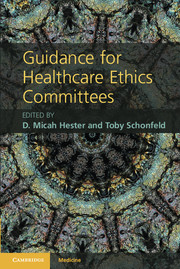Book contents
- Frontmatter
- Contents
- Contributors
- Preface
- Section 1 The Context of Healthcare Ethics Committee Work
- Section 2 Consultation
- Section 3 Policy Development and Organizational Issues
- 16 Ethics committees and distributive justice
- 17 Developing effective ethics policy
- 18 Implementing policy to the wider community
- 19 Ethics in and for the organization
- Section 4 Educating Others
- Index
- References
16 - Ethics committees and distributive justice
Published online by Cambridge University Press: 05 August 2012
- Frontmatter
- Contents
- Contributors
- Preface
- Section 1 The Context of Healthcare Ethics Committee Work
- Section 2 Consultation
- Section 3 Policy Development and Organizational Issues
- 16 Ethics committees and distributive justice
- 17 Developing effective ethics policy
- 18 Implementing policy to the wider community
- 19 Ethics in and for the organization
- Section 4 Educating Others
- Index
- References
Summary
Objectives
Distinguish distributive justice questions from other types of ethical questions that hospital ethics committees face.
Identify competing conceptions of the health professional’s ethical role in making cost containment and rationing decisions at the bedside.
Explain the importance of developing institutional policies to guide the distribution of scarce healthcare resources, and the response to needy and vulnerable patient groups.
Appeal to justice principles to formulate and defend a hospital policy for responding to needy patients, then apply this policy to an individual case.
A physician brings the following case to the ethics committee.
Case
Mr. Nguyen, 54, presented to clinic with a devastating surgical complication: his abdominal incision had split open 1 week after emergency surgery. He was taken back to the operating room, and the deepest layer of his abdominal wall was sewn closed. Doctors treated the infection that had caused his wound to fall apart. Yet he still had a 3-inch crevice along the middle of his belly. Until the edges contracted and the gaping expanse filled in on its own, he and his wife were instructed to pack damp gauze into the wound daily to keep it clean and help it heal. A few weeks after discharge, Mr. Nguyen was seen in clinic by the treating physician, Dr. Morris, who noticed that the gauze was packed more loosely and changed less frequently than the patient was instructed. What should have been white and fluffy looked dried and yellowed, and his wound was no longer clean and healthy, but covered with crusty patches. As the physician began to discuss with the patient the importance of dressing changes, the patient leaned over to interrupt. “Hey, Doc,” Mr. Nguyen said, pointing to the pile of unopened gauzes the physician had brought into the room, “Could I have the extra? This stuff isn’t cheap.”
- Type
- Chapter
- Information
- Guidance for Healthcare Ethics Committees , pp. 122 - 129Publisher: Cambridge University PressPrint publication year: 2012

